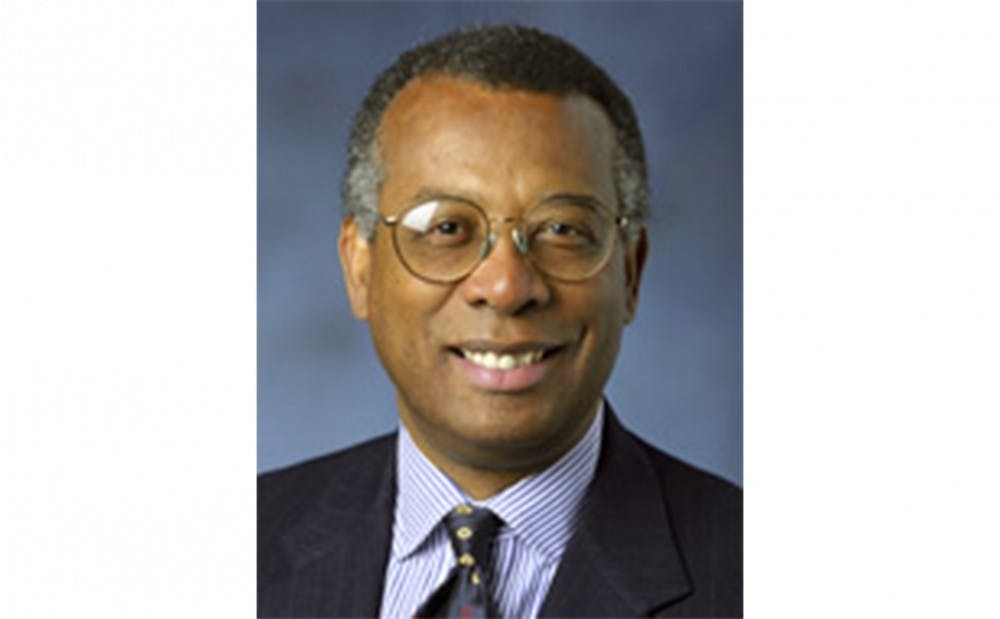Following an article examining a lawsuit filed by men’s soccer player Ciaran McKenna against Duke for allegedly mishandling his sexual assault hearings, The Chronicle is taking a closer look at aspects of the case, beginning with the role of James Coleman, Jr. a Duke law professor.
One of the strongest critics of the disciplinary process in the sexual misconduct case involving soccer player Ciaran McKenna has been Duke law professor James Coleman, Jr.
Coleman, John S. Bradway professor of the practice of law, agreed to become McKenna’s faculty advisor after reviewing the facts of McKenna’s case and concluding that Duke was violating McKenna’s due process rights. Coleman pushed back against Duke’s handling of McKenna’s case as it made its way through the student conduct system and then testified as a witness in support of the lawsuit McKenna filed against Duke and Dean of Student Conduct Stephen Bryan.
Throughout the process, Coleman has made statements arguing that McKenna has been mistreated by the University’s disciplinary process.
“I believed that [in this case] not only had there been a procedural error but that there was no basis for anyone to find that a reasonable person had known that there was no consent,” he said during testimony in McKenna’s legal case.
Coleman explained that the director of compliance in the athletics department, who believed McKenna was not being treated fairly by the University, asked him to be McKenna’s faculty advisor after an initial undergraduate conduct panel found McKenna responsible for sexual misconduct.
Both Mary Giardina, director of compliance in the athletics department, and Todd Mesibov, assistant director of athletics for compliance, declined to comment.
The original panel was not convinced that McKenna’s accuser verbally said no. However, the panel did unanimously conclude that “his version of the events that led up to sexual intercourse fails to show that the complainant clearly and affirmatively consented to having sexual intercourse.”
Coleman said that he has been a faculty advisor a total of four times and explained that he takes on this role when he believes a student is being treated unfairly.
“What I look for are cases where I think there is a significant potential that a student will be treated unfairly because of the way that the process seems to be unfolding, and also there is an opportunity when that situation exists to take whatever corrective action that would alleviate the concern,” he said during his testimony.
Coleman has a long history of working on such cases. In 2006, he chaired the Lacrosse Ad Hoc Review Committee—convened by President Richard Brodhead during the Duke lacrosse scandal to investigate the behavior of the team.
John Burness—visiting professor of the practice in the Sanford School of Public Policy and senior vice president for public government affairs and public relations during the lacrosse scandal—noted that Coleman typically involves himself in cases when he recognizes that a procedural error has occurred.
“Jim is a really first-class lawyer,” Burness said. “He is clearly a very independent thinker.”
Coleman also believed that the panel which had found McKenna responsible used the wrong standard to determine whether McKenna’s accuser had given consent through her actions. Coleman then guided McKenna’s efforts to appeal the finding that he was responsible for misconduct. An appeals panel found that the original conduct panel had in fact failed to use the required “reasonable person” standard when determining whether McKenna’s accuser had given consent.
After the appeals panel made its decision, Coleman pushed back against a decision by Bryan to have a new undergraduate conduct panel completely rehear McKenna’s case. In particular, Coleman believed that since the first conduct panel had not found that McKenna’s accuser said no to having sexual intercourse, the second panel should not be able to reconsider that finding.
“This is indefensible,” Coleman wrote in a Sept. 22 email to Larry Moneta, vice president for student affairs, and Pamela Bernard, vice president and general counsel. “Sending this case to a new hearing panel to give the complainant another chance to convince a different panel that she said ‘no’ flies in the face of any concept of fairness in these cases.”
In addition, Coleman wrote that he did not believe the government office responsible for determining the fairness of procedures for handling sexual assault on college campuses would agree that the process in McKenna’s case was fair.
“I seriously doubt that the Office of Civil Rights, which I once advised as Deputy General Counsel of the Department of Education, would agree with the process that is being contemplated,” he wrote. “I hope the University will step in to avert this unfairness.”
However, Bryan convened a second panel to rehear McKenna’s case, which found that McKenna’s accuser had verbally denied consent and found McKenna responsible for sexual misconduct.
Duke argued during hearings for McKenna's lawsuit that Duke’s policies gave it latitude to send McKenna's disciplinary case to a second panel for rehearing after the appeal.
Get The Chronicle straight to your inbox
Sign up for our weekly newsletter. Cancel at any time.
During his testimony in McKenna’s case against Duke and Bryan, Coleman summed up his thoughts on the case by saying that he did not believe McKenna’s disciplinary process was “just.”
“I don’t think that it protected the interests and rights of [McKenna], and I think that it involved a misapplication of Duke’s own policy to the detriment of [McKenna],” he said.
Amrith Ramkumar and Claire Ballentine contributed reporting.

